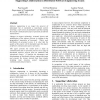Free Online Productivity Tools
i2Speak
i2Symbol
i2OCR
iTex2Img
iWeb2Print
iWeb2Shot
i2Type
iPdf2Split
iPdf2Merge
i2Bopomofo
i2Arabic
i2Style
i2Image
i2PDF
iLatex2Rtf
Sci2ools
103
click to vote
APSEC
2000
IEEE
2000
IEEE
Supporting collaboration in distributed software engineering teams
Software engineering is no longer the preserve of individuals but is essentially a team-based activity involving a wide variety of stakeholders and thus making the need for communication and co-operation an inherent characteristic. Changes in support technology, economic factors and globalisation of the software process is resulting in the geographical separation of personnel. Where such distribution of personnel occurs, it is clear that the quality of the project will be dependent upon the degree of effective communication and co-operation. This paper presents the results from a study of communication and co-operation practices on a range of distributed software projects from an industrial and educational context. It analyses the advantages and disadvantages of distributed software engineering teams and presents the lessons learned from these studies including team structure, project management, communication and procedures.
Related Content
| Added | 30 Jul 2010 |
| Updated | 30 Jul 2010 |
| Type | Conference |
| Year | 2000 |
| Where | APSEC |
| Authors | Paul J. Layzell, Pearl Brereton, A. French |
Comments (0)

